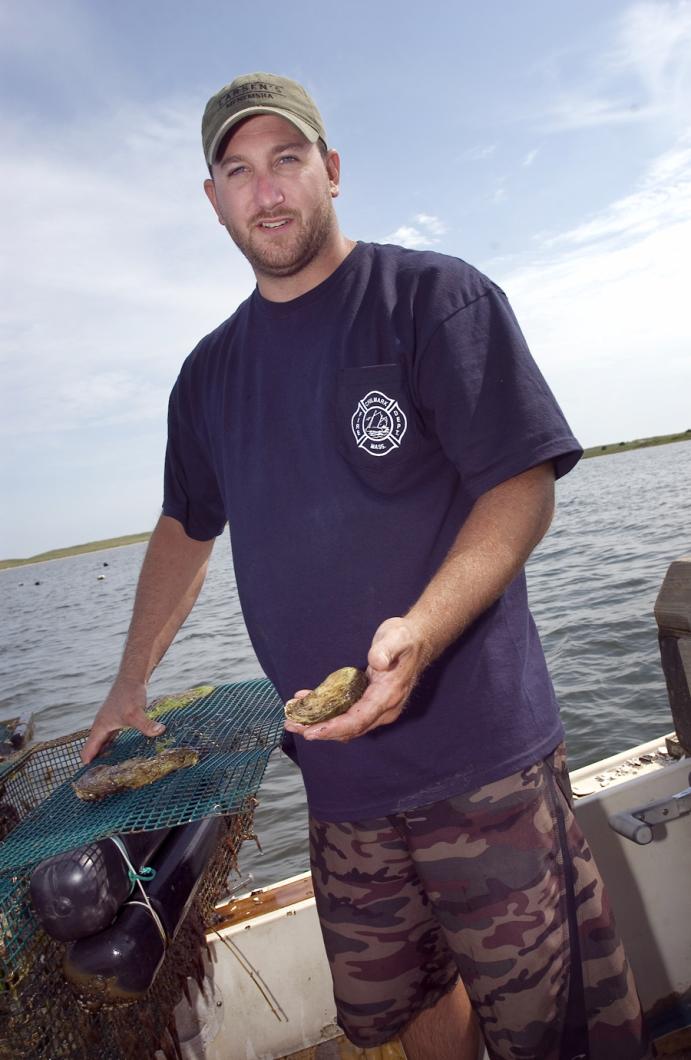Jeff Lynch wasted no time getting down to business on the day he was appointed West Tisbury shellfish constable last month. He’d been out on the water earlier in the day, and he already knew what needed to be done.
Mr. Lynch, 27, of Chilmark, already has plenty of experience. He works as an assistant to Isaiah Scheffer, the Chilmark shellfish constable, a job he has held for more than a year. And he got plenty of tips on how to commercially fish for oysters in Tisbury Great Pond from his predecessor, the late Tom Osmers. “I still have the drags that Tom made for me,” Mr. Lynch said in an interview this week.
By keeping his position as assistant shellfish constable with Chilmark and working as the “more-than” part-time position of West Tisbury shellfish constable, Mr. Lynch hopes to eke out a living. And it is especially good for the oysters and other shellfish in Tisbury Great Pond.
Mr. Lynch said he has received a lot of community support from towns on both sides of the pond to work toward bringing oyster production back to where it was decades ago. Great pond native oysters are coming out of a difficult period, having been infected with Dermo, a southern water disease that began to show up in Island great ponds about 10 years ago. Though harmless to humans, Dermo is ruinous to oysters and the disease caused a massive die-off. The oyster fishery collapsed and the ponds were closed to fishing for years. Dermo is now in decline, thanks in part to the work of the Martha’s Vineyard Shellfish Group, which has found a way to raise a strain of disease-resistant oysters. Those oysters are the parents of the current generation of healthy oysters now growing in the Tisbury Great Pond. Twenty per cent of the oysters are resistant to the disease, according to Rick Karney, director of the shellfish group. In addition, the Dermo is in remission.
Mr. Lynch has a vision of restoring oysters to a vibrant state of health in the pond — and it’s not just for the benefit of recreational and commercial shellfishermen. “They clean the pond,” he said, explaining that they are great filter feeders, capable of consuming copious amounts of nitrogen-fed algae in the pond. A healthy oyster population helps keep the water clean and clear.
There have already been meetings between shellfish committees in West Tisbury and Chilmark about jump-starting the fishery.
Among other things, about 100 bushels of oysters have been moved from West Tisbury’s Town Cove to an area on the eastern end of the pond, where shell culch was spread on the bottom a few weeks ago. Mr. Lynch said a group of volunteers helped spread the 40 cubic yards of sea clam shell culch. Juvenile oysters will attach to the culch, which keeps them from becoming buried in the silt.
Mr. Lynch also plans to relocate an electric-powered shellfish upweller into the great pond, with the help of Arnie Fischer at Flat Point Farm, one of the pond’s riparian property owners. They already have a grow-out facility on Manter family property on the pond. Populating the great pond with oysters can have far-reaching benefits for the future of the pond, Mr. Lynch said.
Mr. Karney, whose hatchery raises juvenile shellfish for all the Island towns, has high praise for the new West Tisbury shellfish constable. “The beauty of Jeff Lynch is that he is already working with Mr. Scheffer [in Chilmark],” Mr. Karney said. “There is a lot of good collaboration between West Tisbury and Chilmark,” he added.
On the subject of Dermo, Mr. Karney said the great ponds are not out of the woods yet. “The disease could still show up. Dermo likes really hot dry summers. And we haven’t had one for a few years, “ he said. But with a growing population of healthy, Dermo-resistent oysters, the outlook remains bright.
Mr. Lynch had the highest praise for the hard work done by his predecessor, Tom Osmers, who died of cancer in March. He said Mr. Osmers was a great ambassador on the waterfront and spread his enthusiasm for shellfish to the experienced and inexperienced alike. “I think he’d be happy to know I am here,” Mr. Lynch said.






Comments
Comment policy »